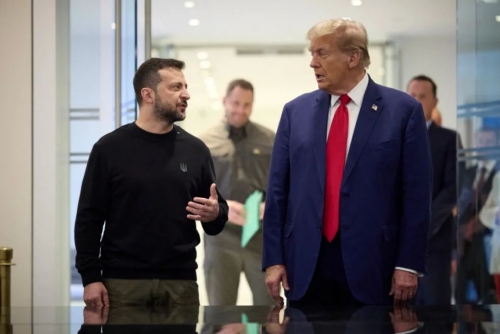Zelensky to Meet Trump in Washington to Sign Mineral Resources Deal
TDT | Manama
Email: mail@newsofbahrain.com
Ukrainian President Volodymyr Zelensky is set to meet US President Donald Trump in Washington this Friday for a landmark agreement on sharing Ukraine's mineral resources. The deal is a significant step for both countries, with Zelensky calling it a preliminary agreement, while expressing hopes for further accords that would include security guarantees to deter renewed Russian aggression.
However, President Trump has tempered expectations regarding US involvement, stating that the US would not provide guarantees "beyond very much," and suggesting that Europe's responsibility lies in providing greater security to Ukraine. Trump also appeared to rule out the possibility of Ukraine joining NATO, a longstanding aspiration of Zelensky, emphasizing that Ukraine's NATO membership was one of the driving forces behind the ongoing war with Russia.
During a cabinet meeting on Wednesday, Trump argued that the presence of American workers extracting rare earth metals in Ukraine would serve as "automatic security" for the country, urging Kyiv to abandon its NATO ambitions. "Forget about NATO," Trump said, as he reiterated Russia's claims that NATO's expansion had been a contributing factor to the conflict.
Despite Trump's statements, Zelensky maintained that without security guarantees, a ceasefire would remain unattainable. "We won’t have a ceasefire, nothing will work, nothing," Zelensky asserted, emphasizing the need for a path toward NATO or an alternative agreement that could provide the security Ukraine requires.
The dispute over NATO membership has been a point of contention between Russia and Ukraine. Russia has consistently opposed Ukraine’s NATO bid, fearing it would bring NATO forces too close to its borders. In 2008, NATO had signaled that Ukraine could eventually join the alliance, but this promise has remained unfulfilled.
Trump's suggestion that European peacekeeping troops could be stationed in Ukraine as part of a ceasefire deal has met with resistance from Russia. Meanwhile, European representatives were excluded from initial talks between the US and Russia. Kaja Kallas, the EU High Representative for Foreign Affairs and Security Policy, stressed that any peace agreement on European soil must involve European agreement. "For any kind of deal to work on European soil, you need the Europeans on board," she stated.
The mineral resources deal, which was formally backed by the Ukrainian government on Wednesday, aims to create an "investment fund" for Ukraine’s reconstruction. Key details of the agreement remain undisclosed, but Zelensky has described the deal as a "framework agreement," hoping that it will pave the way for future deals, particularly in the context of Ukraine's reconstruction post-war.
This mineral resources deal was initially proposed by Zelensky last year as a means of securing continued US support for Ukraine, offering tangible resources in exchange for continued assistance. However, disagreements over the substance of the deal have caused tensions between Trump and Zelensky, particularly regarding the scope of the agreement. Reports suggest that the initial request from the US for $500bn in mineral wealth has been dropped, but both sides have not yet reconciled their views on the deal's terms.
Trump has lauded the deal as an opportunity for the US to recoup funds spent on supporting Ukraine, calling it a "very big agreement." On the other hand, Zelensky continues to view it as a preliminary step that requires further negotiation to fully realize Ukraine’s goals.
In addition to these talks, UK Prime Minister Sir Keir Starmer is expected to meet both Trump and Zelensky separately later this week to discuss the ongoing conflict in Ukraine. The international community continues to watch closely as these high-level discussions unfold, with the hope that they may pave the way for a resolution to the ongoing war.
However, challenges remain, particularly in Ukraine’s heavily contaminated eastern regions, where a quarter of the land is still covered in landmines. Additionally, much of Ukraine's mineral wealth remains under Russian occupation, further complicating access to these resources.
As negotiations continue, the global stage remains tense, with each party balancing its national interests against the backdrop of a complex geopolitical conflict that shows no immediate signs of resolution.
Related Posts

